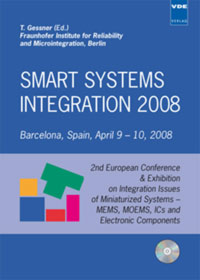Fabrication and characterization of a passive silicon-based direct methanol fuel cell
Konferenz: Smart Systems Integration 2008 - 2nd European Conference & Exhibition on Integration Issues of Miniaturized Systems - MOMS, MOEMS, ICS and Electronic Components
09.04.2008 - 10.04.2008 in Barcelona, Spain
Tagungsband: Smart Systems Integration 2008
Seiten: 4Sprache: EnglischTyp: PDF
Persönliche VDE-Mitglieder erhalten auf diesen Artikel 10% Rabatt
Autoren:
Sabate, N.; Esquivel, J. P.; Santander, J.; Torres, N.; Gràcia, I.; Ivanov, P.; Fonseca, L.; Figueras, E.; Cané, C. (Institut de Microelectrònica de Barcelona-(CNM-CSIC), Campus UAB. 08193 Bellaterra, Barcelona, España)
Inhalt:
The increasing presence of sensing and actuating MEMS in different application fields (automotive, food industry, security …) in the last decade has generated an increasing demand of light and efficient power sources. Regarding both functionality and cost, the integration of these power sources within the devices to be powered arises as the optimal solution and opens interesting opportunities in future advanced MEMS-based devices. A lot of research has been performed in the study of active methanol fuel cells, in which usually the liquid fuel and the oxidant are pumped externally. However, the application of this kind of cells as portable power sources has lead to simpler approaches that give up ancillary devices such as pumps or gas compressors. In this way, a passive fuel cell approach offers the advantage of a simpler and compact design, which is very adequate regarding MEMS integration. In this work, we present a passive silicon direct methanol fuel cell based on a hybrid approach, which means in this case that a commercial MEA has been assembled with two silicon micromachined components. The device yields one of the highest power density values reported up to date in a MEMS-based DMFC operating at room temperature.


